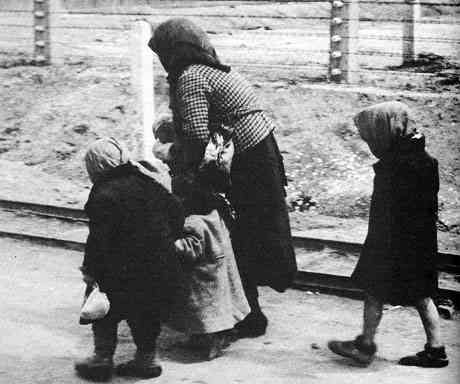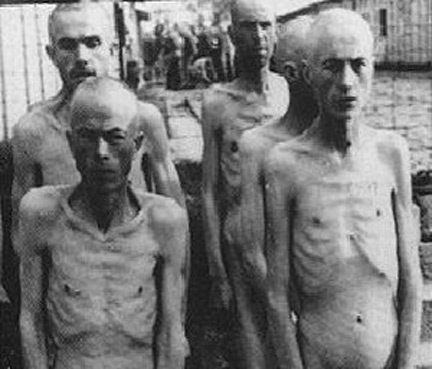Following Orders
"The capacity of the gas chambers and the capacity of the crematoria were quite limited. Someone said that five thousand people were processed in 24 hours, but I didn't verify this. I didn't know."
"For the sake of order we waited until Train 1 was entirely processed and finished."
"The process was the same as Auschwitz 1. The only difference was that there were no trucks. They all walked -- some in one direction some in another direction ... to where the crematoria and gas chambers were."
(former) SS sergeant Oskar Groening, 93, Lueneburg, Germany
 |
| -- Jewish Virtual Library -- Last walk to the gas chambers |
"Everything was going very fast. Yelling, crying, pushing; even dogs were barking. I had never experienced anything that fast or that crazy in my entire life."Eva Kor, now of Indiana, is among the 60 or so Auschwitz survivors and their families coming from the United States, Canada, Israel and elsewhere who have travelled to Germany to take part in the trial of former prison guard Oskar Groening, as co-plaintiffs. Scheduled to testify next week, Montrealer Elaine Kalman Naves lost her six-year-old half sister. She and others were tracked down to become survivor-witnesses in this and other forthcoming trials by the painstaking work of Thomas Walther.
"All I remember is her arms [10-year-old child's mother] stretched out in despair as she was pulled away. I never even got to say goodbye."
Eva Kor, 81, Jewish survivor of Auschwitz
He and his clients were satisfied in part with the testimony of the former prison guard. Yet they suspect he is still withholding many details, fulsome as his testimony has been to date. "There is an ocean of truth, but with many islands of lies", stated Mr. Walther, a retired German judge who has worked since 2006 for Germany's central office tasked with tracking Nazi war crimes. Hedy Bohm, who now lives in Toronto was immediately separated from her parents on arrival at Auschwitz when she was 16; she survived, they were gassed.
 |
| Auschwitz prisoners |
The former SS guard is being tried on 300,000 counts of accessory to murder. Between May and July of 1944 Hungarian Jews were transported by cattle cars on tracks leading to the Auschwitz-Birkenau complex in Poland, most of them immediately put to death; gassed by Zyklon B, their corpses shovelled into the giant incinerators whose chimneys spewed black ash all over the adjoining countryside. It was Mr. Groening's job as well as guarding, to collect any cash the consigned-to-death Jews had in their possession, and to send it on to Berlin.
Which he felt justified in doing, since, as he has stated, the Jews awaiting death had no further need of their money, and it rightfully belonged to the state. This more than eloquently expressing his views respecting his part in the destruction of European Jewry; their destiny enfolded within the Final Solution, ridding Europe of their pestilential presence. Germany fought its war of immense dimensions on two fronts; the Axis against the Allies, and Germany against the Jews.
It almost succeeded on both fronts.
Mr. Groening spoke of German efficiency in describing the scenes prevailing with the arrival of the trains bursting with Jewish men, women and children, hungry, dispirited, tired, thirsty, not knowing what awaited them at Auschwitz where the gated sign read "Arbeit Macht Frei". "It was very orderly and not as strenuous" on the ramp at Birkenau, he testified, of the Jews walking to the gas chambers and crematoria.
If found guilty, which he does not believe he will be, he will face between three and fifteen years as a prisoner. After having lived 70 years of his life, free to do with it whatever he planned to, the atrocities of the war years benignly behind him, for he was guilty of nothing but being a proud German, a sterling citizen of the Third Reich, a patriot then; an elderly German with an unfortunate past now. Forced to undergo a rather undignified and undeserved denouement.
 |
| Auschwitz prisoners |
Labels: Atrocities, Germany, Holocaust, Jews, Nazis, World War II

<< Home